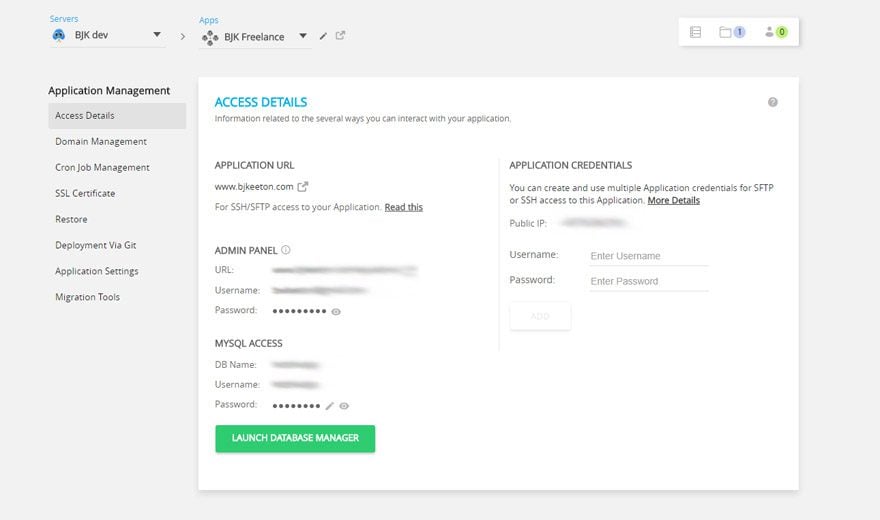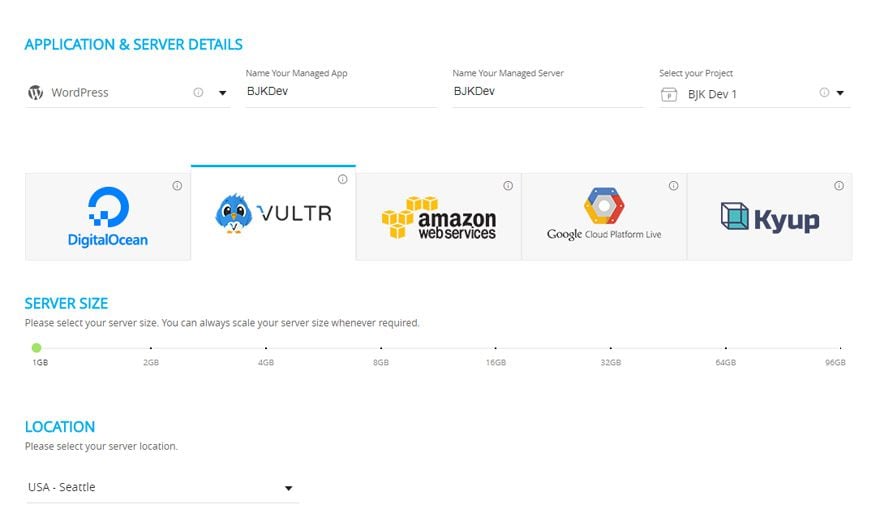You’ve probably heard of WPEngine and Flywheel, two of the more popular managed WordPress hosting companies. (And there are bunches of others, too.) But you might not be familiar with Cloudways, a managed hosting company (though not specifically just managed WordPress).
Cloudways does offers a lot for WordPress users, though. Many of their hosting options are modular, which differs a little from typical managed hosting companies, so if you’ve been holding off on checking out managed hosting, you may like what Cloudways offers.
What is Managed WordPress Hosting?
First off, Cloudways is not just for WordPress. While what we’re discussing is their WordPress management, you can also use them for Drupal, Joomla, Magento, or other CMS frameworks if you want. (But why would you when you’ve got WordPress, right?)
Now, here’s the entry from the Cloudways FAQ:
Through the WordPress Cloud Hosting Platform, you have everything from monitoring, scaling and cloning to backups, restores, and much more under 1-click operation.
Additionally, the Managed Hosting Platform is scalable and is capable of handling WordPress multisite and ecommerce website using WooCommerce. In comparison to other hosting Platforms, Cloudways offers you the opportunity to experience industry’s first, CloudwaysBot. For Developers, you have an option to use the API for integrations, automation, and development on top of the Hosting Platform.
Essentially, you get built-in WordPress features without any of the hassle of configuring it yourself. That means a lot when you use tools like WP-CLI, putting together a multisite network, or getting an SSL certificate set up and working straight out of the box.
Digging into the Cloudways Dashboard
The first big difference you’ll see in Cloudways is the lack of a cPanel. If you’re used to that being your primary dashboard, Cloudways will take some getting used to. I know it did for me. You still get your WordPress admin dashboard through /wp-admin, but you also get a slew of server-side options, too.
The basic dashboard you see on login will be a list of your servers that shows the number of applications (WordPress installs for us, but also other CMSes, too.)

You will also be able to see your active installs on that server, easily identifiable by the icon to their left. You see what server they’re each located on, as well as which project folder you’ve sorted them into (fantastic for freelancers or teams, let me tell you).

Inside each application, you get a bunch of options, including git integration, SSL management, cron jobs, and FTP/MySQL login info. (FYI: you must use an FTP client to work with your files–there is no file manager like in cPanel.)

Overall, that’s what you’ll be interacting with on a daily basis. Like I said earlier, getting to and using /wp-admin is no different than anywhere else.
The Ups
So. Much. Control.
For a managed hosting solution, Cloudways lets you control pretty much every aspect of your account. You choose your datacenter’s location, the individual provider that particular server is with, and the capacity of the server. You also see the base price you’ll pay, which depends on the provider you go with (such as Digital Ocean versus Amazon AWS), and the cost-per-hour that you will pay in terms of scalability. (I think the cheapest base price, as of this writing, is Vultr at around $11 USD per month.)
If you eventually decide to swap to a different datacenter and provider, it’s easy. Let’s say you need to scale up and move from Vultr to AWS, it’s an easy application transfer they handle. If you’ve ever migrated an install, you know how many oodles of headaches that saves. Oodles of bunches of them.

New WP Installs are Easy to Set Up
Setting up a new WordPress installation was probably easier than finding a cat video on the internet. You pick whether you want a multisite install, ecommerce based on WooCommerce, or a simple, single instance of WP. Then you set up the admin credentials, and you’re good to go. Easy peasy. It’s pretty much the same as setting up a server (check the above screenshot), but without the server info.
The options Cloudways gave were useful. Over the course of a dev/designer’s career, the time it takes to install and set up WooCommerce can add up. The same for going into the PHP files and setting up the multisite network. This is specifically the kind of utility that you want in a managed WordPress host–simple, useful, quality-of-life upgrades.
Easy to Transfer
The process of transferring to other users is a piece of cake. You just pick the server or application you want to transfer, do a few clicky-clickies, and bada-bing, it’s done. If only everything in the software industry were that painless, am I right?
This capability to transfer between servers and accounts is very handy for designers who need to hand fresh sites off to clients, as well as hosting resellers. It gives you folks a lot of options other hosts don’t.
Very Fast and Reliable
Cloudways touts high-speed servers, and you get high-speed servers. They’re fast, and they’re awesome. When testing my site speed, I went from a B- grade to an A. In the months I had my sites hosted on Cloudways, I didn’t experience any downtime, nor did I have any real hiccups in terms of reliability. They provided exactly what they said they would, and I really, truly appreciate that.
The Downs
Not Everything is Managed
If you expect everything to be handled by Cloudways because it’s “managed” hosting, you may be disappointed. Because of the modular setup, you’re going to be outsourcing and almost cobbling together your suite of features. For instance, email is not handled by Cloudways in any shape, form, or fashion. None. They just don’t have email support. You will be required to purchase what they call “addons” to manage them.
They don’t even transactional emails from contact forms or password resets. You have to purchase an addon (a cheap one, admittedly–$0.10 USD per 1,000 emails) to send it out. And even then, I had to contact support because they included my home address in the footer of every email sent. I was less-than-happy about that one.
(While other managed WordPress hosts like WPEngine and Flywheel do not offer hosted email accounts, they do handle transactional emails through their service, thankfully.)
Support is Meh
On the upside, each and every time I contacted support, I got a friendly and prompt reply. On the downside, each and every time I got that friendly and prompt reply, it contained something along the lines of “I’m sorry, but we don’t handle that ourselves. You’ll have to contact [insert addon or company name here].”
That’s fine. I get that they don’t make those products, but it’s still a little off-putting because I am giving them my money, my account is through Cloudways, etc. Felt a lot like a runaround to me. Especially when my home address was being sent out all willy-nilly.
Configure This, Configure That
One of the benefits of being “managed” is having stuff handled. Being in total control also means you’re in total control, all the way down to adjusting the CNAME and A Records for your DNS. If you’re not willing or able to shell out for addon service, you’re going to be configuring stuff by hand. Even when you’re using the addons (such as DNS Made Easy), there may or may not be any automation.
It may be just me, but when setting up multiple installations across multiple projects that all needed this stuff, it all took so much configuration, I didn’t see it helping me gain any productivity or ease any headaches–which is what I look for in managed WordPress hosting.
The Verdict
For what I personally needed, Cloudways didn’t work. It was a great experience and a wonderful experiment, but in the end, I realized that what I needed was really a VPS or Cloud Host. I never thought I’d say it, but I didn’t have the time to deal with the total control that Cloudways offered.
The service itself, though, is great. It’s fast and does exactly what is offered. The scalability is through-the-roof and migration can be handled with just a few clicks. Users can collaborate with teammates, transfer ownership and hosting to clients, and it’s easy and straightforward to use. Like every other hosting solution on the internet, there are pros and cons you have to weigh to make your decision, but it’s definitely in your best interest to at least check out Cloudways to see if they’re a good fit for you.
Article thumbnail image by pixome / shutterstock.com
The post Cloudways Managed Hosting for WordPress Users appeared first on Elegant Themes Blog.




